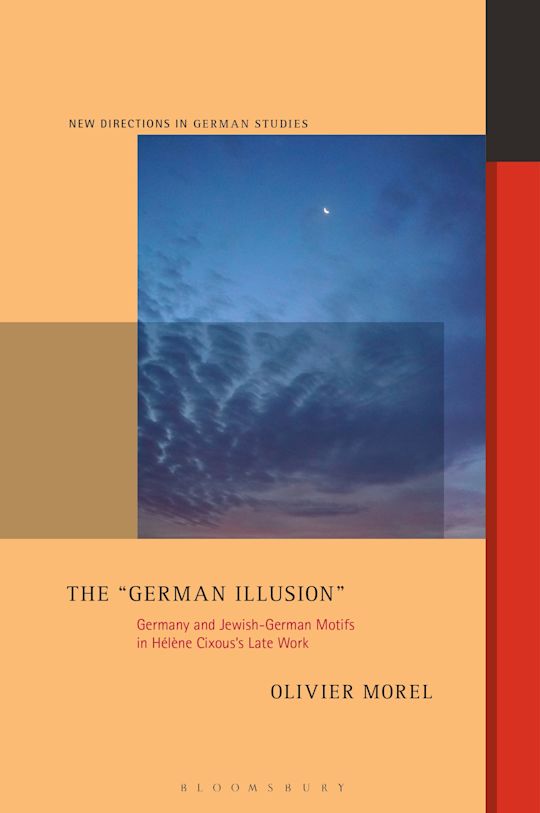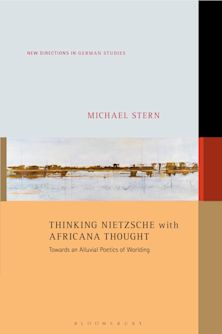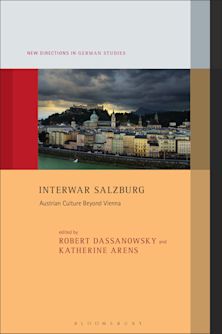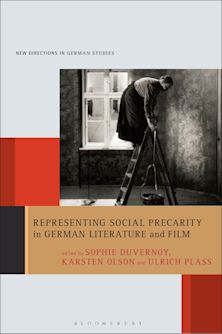The "German Illusion"
Germany and Jewish-German Motifs in Hélène Cixous’s Late Work
The "German Illusion"
Germany and Jewish-German Motifs in Hélène Cixous’s Late Work
This product is usually dispatched within 3 days
- Delivery and returns info
-
Free US delivery on orders $35 or over
Description
Examines Jewish-German “tropes” in Hélène Cixous's oeuvre and life and their impact on her work as a feminist, poet, and playwright.
Hélène Cixous is a poet, philosopher, and activist known worldwide for her manifesto on Écriture feminine (feminine writing) and for her influential literary texts, plays, and essays. While the themes were rarely present in her earlier writings, Germany and Jewish-German family figures and topics have significantly informed most of Cixous's late works. Born in Algeria in June 1937, she grew up with a mother who had escaped Germany after the rise of Nazism and a grandmother who fled the racial laws of the Third Reich in 1938. In her writing, Cixous refines the primitive scene of a “German” upbringing in French-occupied colonial, antisemitic Algeria.
Scholar and filmmaker Olivier Morel delves into the signs and influences that “Germany,” “German,” and “Osnabrück” have exerted over Cixous's work. Featuring an exclusive interview with Hélène Cixous and stills from their travel together to Osnabrück in Morel's 2018 documentary, Ever, Rêve, Hélène Cixous, Morel's The “German Illusion” examines the unique literary meditation on the Holocaust sustained throughout her later texts.
Morel helps us to understand an uncannily original oeuvre that embodies the complexities of modernity's genocidal history in a new way.
Table of Contents
I. I call Germany: The Landline (1916-2016)
1. The first telephone
2. The dream call
3. The last phone call
II. “Os, na, brück”: The Capital of Memory (1933-1935)
1. Ruins and remembrance: from “Os, na, brück” to “Rom'”
2. Osnabrück the instrument of Peace: “recorder,” recorder
3. Remembrer-remember: a detour to Montaigne's Tower… and its ruins
(image)
4. “Je suis, nous sommes le 23 octobre 1935”. The October 23, 1935 picture
5. N'ai-je pas vu (Have I not seen…) la neige pas vue (…the snow not seen)?
III. An Originary Move: The Move of the Origin (1938)
1. Omi was in Osnabrück…
2. “Bericht”
3. “Etwas”
4. Epilog
IV. Zugehör: The Jewish-German psyche
1. “Envoûté,” delirium
2. “We”
3. Epilog: Zugehör
Conclusion: Frauenprotest
Afterword: A filmed-interrupted interview with Hélène Cixous
Acknowledgements
Bibliography
Index
Product details

| Published | Jun 26 2025 |
|---|---|
| Format | Paperback |
| Edition | 1st |
| Extent | 288 |
| ISBN | 9798765107386 |
| Imprint | Bloomsbury Academic |
| Illustrations | 33 b&w illustrations |
| Dimensions | 9 x 6 inches |
| Series | New Directions in German Studies |
| Publisher | Bloomsbury Publishing |
Reviews

ONLINE RESOURCES
Bloomsbury Collections
This book is available on Bloomsbury Collections where your library has access.


































